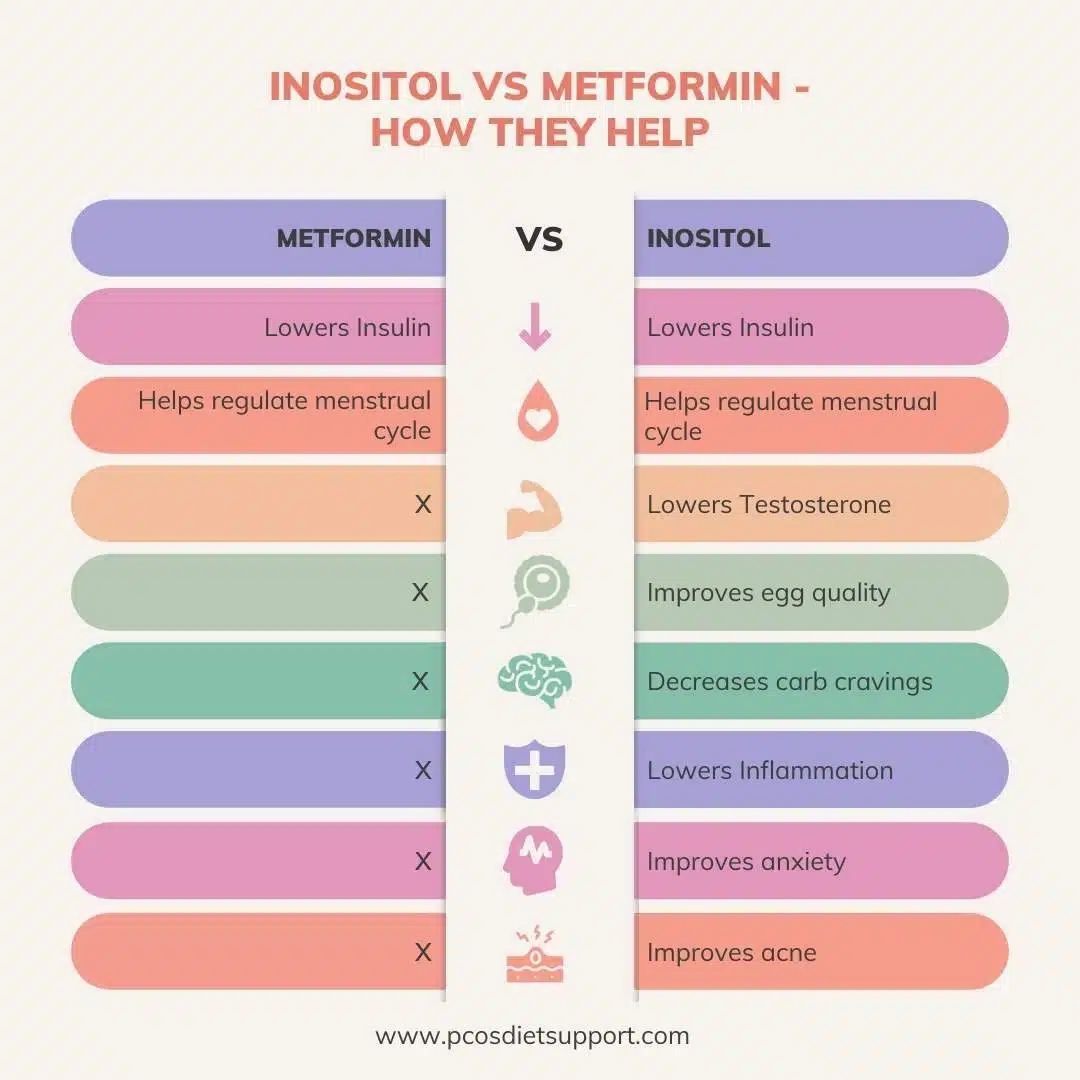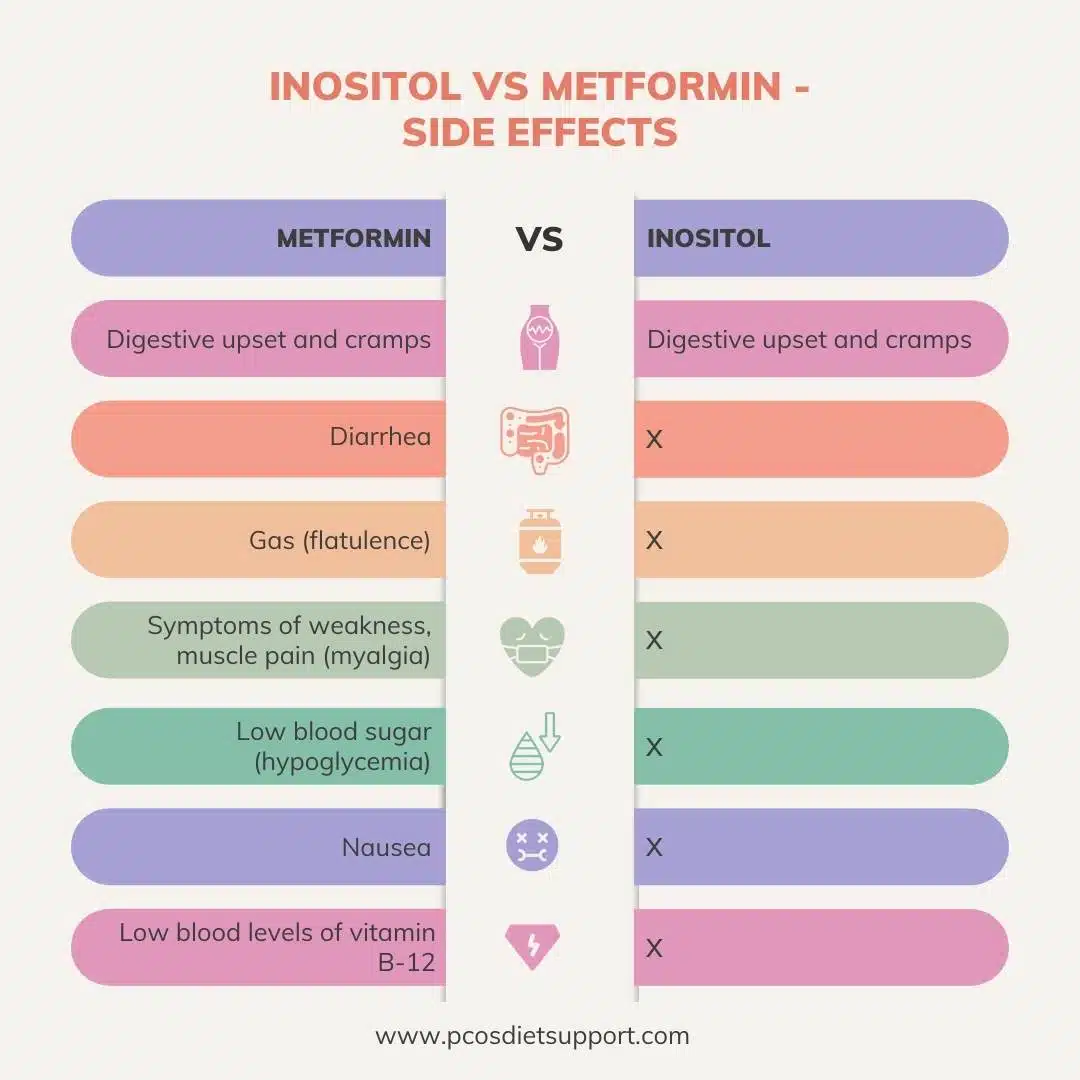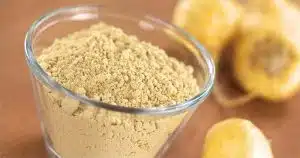Inositol vs Metformin. Both are commonly prescribed for women with polycystic ovary syndrome but which one is better? This is a question I’m often asked in my PCOS Foodies community so I thought I would break it down for you.
In this article, we’ll be comparing the pros and cons of both as well as looking at how they can help your PCOS symptoms.
Before we get into the detail, we need to have a little bit of background into why insulin sensitizers might help women with PCOS.
Insulin Sensitizers for PCOS?

This means that the body is less responsive to the effects of insulin and so produces more in an attempt to bring down blood sugar levels. The result is often higher than normal blood sugar and insulin levels.
Excess insulin has a few different effects on the body when it comes to PCOS (2):
- It can increase androgen production in the ovaries which leads to excess testosterone and all the symptoms that come with it.
- It can stop follicles maturing properly which means that ovulation doesn’t happen as it should.
- It can make you more likely to store fat around your waist (abdominal obesity).
So, anything that can help to lower insulin levels or make the body more responsive to insulin could potentially help with PCOS. This is where both inositol and metformin come in.
What is Metformin?
Metformin is a medication that has been used to treat type 2 diabetes for many years. It works by making the body more responsive to insulin and lowering blood sugar levels.
A recent study looked at the effects of metformin on women with PCOS (3). The study found that metformin improved insulin resistance, androgen levels, ovulation and pregnancy rates.
How does Metformin Work?
According to Angela Grassi, RD, Metformin works in 3 ways:
Metformin lowers blood glucose and insulin levels in three ways:
- It reduces the liver’s production of glucose.
- It makes your liver, muscle, fat, and cells more sensitive and responsive to the insulin your body makes.
- It makes it harder for your body to absorb the carbohydrates you eat.
Interestingly, one of the ways that metformin works is that it improves one of the same insulin signalling pathways that myo-inositol is involved in.
What is Inositol?
Inositol is a type of sugar that’s found in many foods including fruit, beans, grains, and nuts. It’s also available as a supplement.
Myo-inositol is the most common form of inositol and has been shown to have some benefits for women with PCOS.
A recent study compared the effects of myo-inositol and metformin on women with PCOS. The study found that myo-inositol was as effective as metformin in improving insulin resistance, androgen levels, ovulation and pregnancy rates (4).
How Does Inositol Work?

When insulin attaches to the cell wall, it sets in motion a series of changes within the cell. Inositol plays a role in this series of changes and is important for insulin to be effective within the cell (5)
Inositol can help stop insulin’s effect on the cell. It helps to turn off the switch.
So, both inositol and metformin can help to improve the symptoms of PCOS by making the body more responsive to insulin but there are also some significant differences. The question is, what are the pros and cons of each?
Metformin vs Inositol – The Pros
Let’s start with the pros of Metformin…
The Pros of Metformin for PCOS
Metformin has been widely studied for women with PCOS.
Randomized clinical trials and research seem to suggest that there are three main benefits in prescribing inositol for women with PCOS (6):
- Improved menstrual cycle regulation
- Improved insulin sensitivity
- Improved ovarian function
- Decreased androgen levels
- It is also often prescribed for women with gestational diabetes, something that women with PCOS have an increased risk of developing.
It is important to note that in this one particular study, women showed little change in the body mass index and didn’t necessarily lose weight after taking Metformin for 6 months.
The Pros of Inositol for PCOS

- Increased progesterone
- Increased SHBG (sex hormone binding globulin) – Deals with any free testosterone in our blood stream
- Lowered testosterone levels
- Improved insulin sensitivity
- Decreased luteinizing hormone
- Induced weight loss
- Ovulation
- Improved egg quality and decreased reproductive abnormalities.
There are a lot of benefits to using inositol when it comes to PCOS and it can result in a significant improvement in all of your PCOS symptoms.
Let’s talk about some cons of both metformin and inositol.
Inositol vs Metformin – The Cons
The Cons of Metformin for PCOS
Whilst there are many benefits to taking metformin for PCOS, there are also some drawbacks:
- It can cause side effects like nausea, vomiting, bloating, and diarrhea.
- You need to be careful about the dose because too much can cause low blood sugar levels (hypoglycemia).
- Metformin can also cause a condition called lactic acidosis, which is when there is too much lactic acid in the blood. This is rare but can be fatal.
- Metformin can interact with other medications, so you need to be careful if you are taking any other medication or supplement.
- Metformin can also cause vitamin B12 deficiency, so you need to have your vitamin B12 levels monitored if you are taking metformin.
The Cons of Inositol for PCOS
Inositol is a very well-tolerated supplement with few side effects. The most common side effect is digestive upset, which can be alleviated by taking inositol with food. Inositol can also cause headaches in some people.
So, you can see that although both metformin and myo inositol can be helpful in managing some of the symptoms of PCOS, there is a significant difference in the way that women experience the side effects. Inositol is generally very well tolerated with few side effects, whereas metformin can cause some serious side effects.
Myo inositol versus metformin – A side by side comparison
How they help with PCOS
Some of the side effects of both
Commonly Asked Questions about Metformin and Inositol
Should I take metformin and inositol?

However, both are considered an insulin sensitizer so taking them together can cause your blood sugar levels to go low so you do need to be careful with combining the two.
Also, if your doctor has prescribed Metformin, please do speak with them first before adding inositol or any other supplement to your routine as they will be able to advise you on the best course of action.
Is metformin the same as myo inositol?
No, metformin and myo inositol are not the same. Metformin is a medication that is used to treat type 2 diabetes and myo inositol is a supplement. They both work in different ways and have different side effects.
Does metformin have inositol?
No, metformin does not have inositol. Inositol is a supplement that can be taken alongside metformin.
Is Ovasitol better than metformin?
Ovasitol is a combination of d-chiro-inositol and myo inositol from a company called Theralogix. It is one of the most popular inositol supplements on the market.
There is no research to suggest that Ovasitol is better than metformin, however, many women find that taking inositol helps to reduce some of the side effects they experience from metformin.
Summing it Up
Both metformin and myo inositol can be helpful in managing PCOS but they work in different ways. When it comes to PCOS, inositol may be a better option than metformin because of the lack of side effects. However, it is important to speak to your doctor before starting any new supplement, especially if you are taking any medication.
I have only ever taken inositol for my own PCOS and love how it helps me to manage my symptoms with little to no side effects. I’ve also never taken metformin so I would love to hear from you!
Have you tried myo inositol or metformin for PCOS? What was your experience like? Let me know in the comments below!
- sustainable pcos weight loss strategies
- Over 5500 women have done it and seen results
- [bonus] Done for you pcos meal plans
- [bonus] intermittent fasting for pcos course
- [BONUS] personalised nutrition plan
JOIN OVER 5,500 OTHERS
References:
1Tabassum, R., et al. “Prevalence and Clinical Profile of Insulin Resistance in Young Women of Poly Cystic Ovary Syndrome: A Study from Pakistan – PMC.” PubMed Central (PMC), www.ncbi.nlm.nih.gov, 1 Apr. 2013, https://www.ncbi.nlm.nih.gov/pmc/articles/PMC3809275/.
2Marshall, J., & Dunaif, A. (2012, January 1). All Women With PCOS Should Be Treated For Insulin Resistance – PMC. PubMed Central (PMC); www.ncbi.nlm.nih.gov. https://www.ncbi.nlm.nih.gov/pmc/articles/PMC3277302/
3Lashen, H. (2010, June 1). Role of metformin in the management of polycystic ovary syndrome – PMC. PubMed Central (PMC); www.ncbi.nlm.nih.gov. https://www.ncbi.nlm.nih.gov/pmc/articles/PMC3475283/
4Kutenaei, M., Teshnizi, S., Ghaemmaghami, P., & Roozbeh, F. (2021, April 13). The effects of myo-inositol vs. metformin on the ovarian function in the polycystic ovary syndrome: a systematic review and meta-analysis. European Review; www.europeanreview.org. https://www.europeanreview.org/article/25565
5Hooper, C. (n.d.). An overview of insulin signaling pathways | Abcam. An Overview of Insulin Signaling Pathways | Abcam; www.abcam.com. Retrieved May 12, 2022, from https://www.abcam.com/pathways/overview-of-insulin-signaling-pathways.
6Moghetti, P., Castello, R., Negri, C., & Perone, F. (2000, January 1). Metformin effects on clinical features, endocrine and metabolic profiles, and insulin sensitivity in polycystic ovary syndrome: a randomized, double-blind, placebo-controlled 6-month trial, followed by open, long-term clinical evaluation – PubMed. PubMed; pubmed.ncbi.nlm.nih.gov. https://pubmed.ncbi.nlm.nih.gov/10634377/











